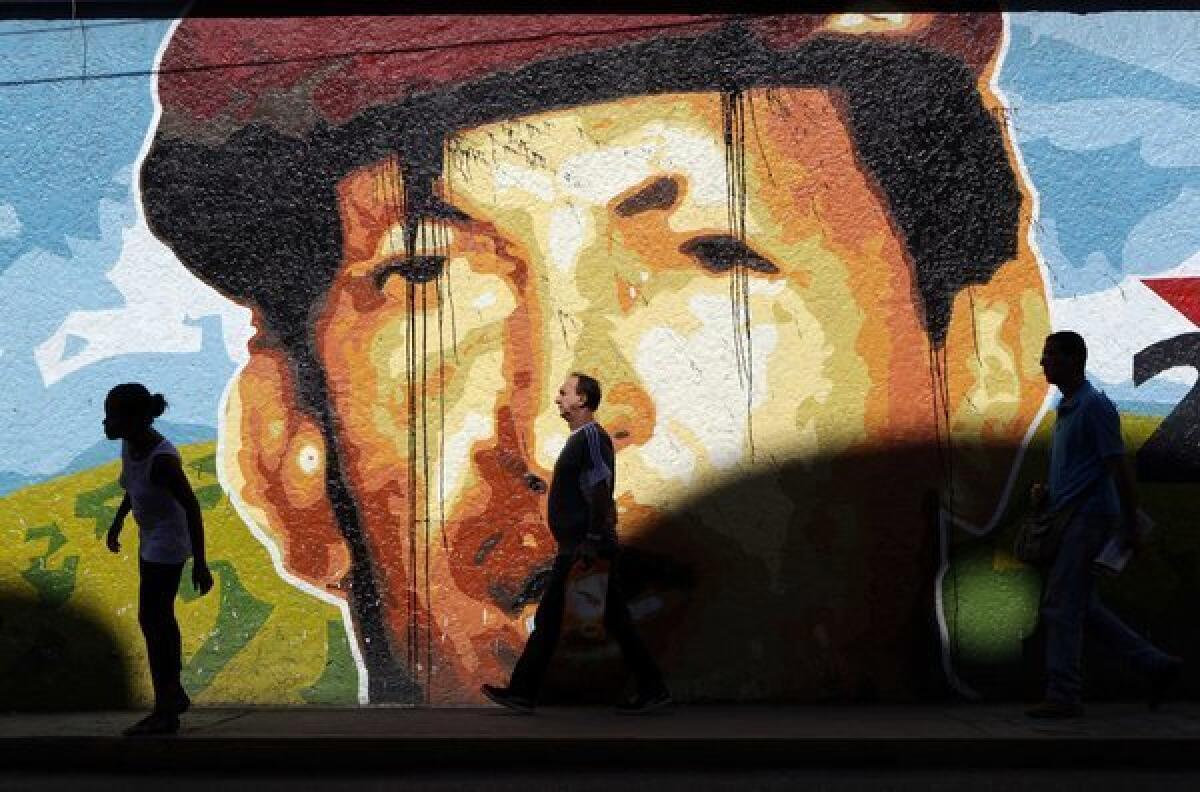In Venezuela, Hugo Chavez reelection raises unity questions

- Share via
CARACAS, Venezuela — Venezuelan President Hugo Chavez and his supporters on Monday celebrated his reelection, while many in the country wondered whether his victory could result in improved relations with opposition parties after a decade of bitterness and division.
Chavez, who captured 55% of the vote Sunday to handily beat challenger and former Miranda state Gov. Henrique Capriles, who received 44%, indicated via Twitter that he’d had a good postelection talk with his opponent.
“Believe me, I’ve had a pleasant telephone conversation with Henrique Capriles. I call for national unity, respecting our differences!” wrote Chavez, giving no further details.
The 58-year-old socialist leader’s victory entitles him to a third six-year term that runs through February 2019. He served his first two years as president before the constitution was changed to allow longer terms in office.
Chavez’s chat with Capriles may not sound like much, but any contact between political adversaries in this polarized country is seen as encouraging. Political rivals have not had much to do with one another since a military coup backed by right-wing business interests in April 2002 briefly unseated Chavez.
Ever since, Chavez has blamed the country’s middle and upper classes, often in insulting terms, for trying to block his socialist “Bolivarian Revolution.”
As a result, there has been little if any bipartisan cooperation in tackling Venezuela’s pressing problems, including fraying infrastructure, deteriorating security and substandard education.
Whether Chavez’s victory will help break down barriers beyond a phone conversation remains unclear. Earlier Monday, his close associate and former army comrade Diosdado Cabello held a news conference at the headquarters of the United Socialist Party of Venezuela to discuss the election results. He was asked about a possible detente with the opposition, and his answer wasn’t encouraging.
“The other side asks us not to forget the 6 million who voted for Capriles. Well, what about the 8 million who voted for Chavez?” Cabello said.
Robert Bottome, editor and publisher of VenEconomy, a Caracas-based economics and politics newsletter, said that Chavez in his Sunday night address to followers “congratulated the opposition for having recognized defeat but didn’t even go through the motions of offering to work together.”
Whether Chavez’s win could lead to a reset of poor relations with the United States won’t be clear until after next month’s U.S. presidential election, one diplomatic source said.
Relations between the two countries have been especially tense since 2010, when Venezuela refused to accept U.S. Ambassador Larry Palmer and the U.S. in turn revoked the visa of Bernardo Alvarez Herrera, Venezuela’s then-ambassador to Washington. There has been no subsequent exchange of ambassadors.
In any case, Chavez partisans exulted Monday. With 97% of ballots counted, Chavez had 8.04 million votes, or 55.1%, to Capriles’ 6.46 million votes, or 44.3%.
Although his victory margin was less than in past elections, Chavez, who was diagnosed with cancer last year, won by more votes than had been expected by most pollsters, several of whom predicted a Capriles victory. Chavez won 21 of 23 states plus the Caracas capital district. That puts the opposition at a distinct disadvantage in state and local elections set for December.
Chavez’s victory not only demonstrates the hold the charismatic leader maintains on most Venezuelans after 14 years in power, but it also highlights the challenges facing the opposition.
Bottome said Capriles’ defeat leaves open the question of whether he will remain opposition leader and whether the once-fractious parties that united behind him will stay together.
“It was not a humiliating defeat. Capriles went down well against tremendous odds,” Bottome said. “But other candidates now might think it’s their turn.”
Kraul is a special correspondent.
More to Read
Sign up for Essential California
The most important California stories and recommendations in your inbox every morning.
You may occasionally receive promotional content from the Los Angeles Times.










